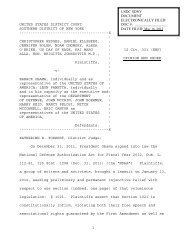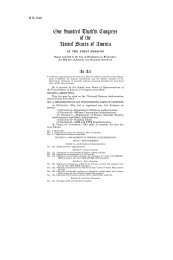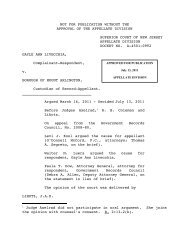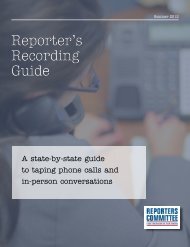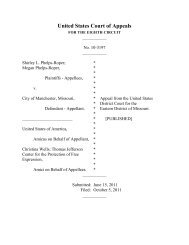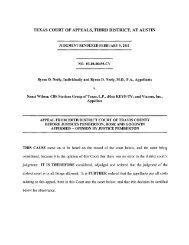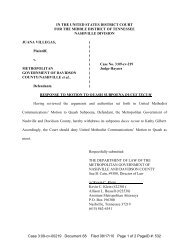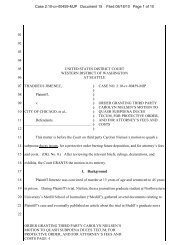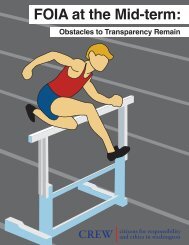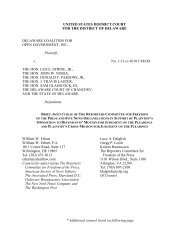Order Re Motion to Limit Pre-Trial Publicity
Order Re Motion to Limit Pre-Trial Publicity
Order Re Motion to Limit Pre-Trial Publicity
You also want an ePaper? Increase the reach of your titles
YUMPU automatically turns print PDFs into web optimized ePapers that Google loves.
DISTRICT COURT, COUNTY OF ARAPAHOE,STATE OF COLORADO7325 S Po<strong>to</strong>mac StreetCentennial, Colorado 80112Plaintiff: People of the State of Coloradov.Defendant: James Holmes COURT USE ONLY Case No. 12CR1522Division: 201ORDER RE MOTION TO LIMIT PRE-TRIAL PUBLICITY (D-2)This matter comes before the Court on Defendant’s <strong>Motion</strong> <strong>to</strong> <strong>Limit</strong> <strong>Pre</strong>trial <strong>Publicity</strong>.The Court has reviewed Defendant’s <strong>Motion</strong> and the applicable authorities. Having heardargument from the parties, the Court FINDS and ORDERS as follows:Defendant has sought an <strong>Order</strong> restricting pretrial publicity. Defendant’s case hasalready received attention from the media. The case is likely <strong>to</strong> continue <strong>to</strong> generate mediaattention. In light of such anticipated publicity and the difficulty in anticipating all possiblescenarios, this <strong>Order</strong> is meant <strong>to</strong> provide guidelines <strong>to</strong> all involved in this case.Counsel involved in this matter will no doubt conduct themselves in a professional way.However, the nature of this case and the pretrial publicity that has already occurred, <strong>to</strong>getherwith the anticipated publicity from the trial, demonstrate the need for Court intervention <strong>to</strong> guidethe conduct of counsel and those associated with them <strong>to</strong> avoid lowering the level of advocacy inthis case.When lawyers quarrel with each other, the arguments sometimes tend <strong>to</strong> becomeacrimonious. Disputes of this type divert time, energy and resources from the primary task ofpreparing for trial <strong>to</strong> determine the provability of charges. The public spectacle of a quarrelamong at<strong>to</strong>rneys over allegations of ethical improprieties would greatly reduce the public’sconfidence in the adjudicative process. The news coverage of the proceedings would focus onpersonalities of the advocates and deflect attention from their advocacy of important legal andfactual issues which will determine the outcome of this case.Without suggesting that there have been any violations of general ethical principles, it isnecessary for the Court <strong>to</strong> articulate the following <strong>to</strong> be followed in this litigation in the form ofthis <strong>Order</strong> for future guidance in all forms of extrajudicial statements about this litigation.Colorado Rules of Professional Conduct 3.6 and 3.8 provide the basis for this <strong>Order</strong>.1
I. Extrajudicial Statements by At<strong>to</strong>rneys:A. Any lawyer, law firm or legal representative (investiga<strong>to</strong>rs of any firm) associatedwith the prosecution or defense participating in or associated with the investigation or litigationof this criminal matter shall not, from the filing of a complaint, information or indictment, theissuance of an arrest warrant or arrest, until the commencement of the trial or disposition withouttrial, make or participate in making an extrajudicial statement that a reasonable person wouldexpect <strong>to</strong> be disseminated by means of public communication and that does more than state,without elaboration:(1) The claim, offense or defense involved and, except when prohibited by law, theidentity of the persons involved;(2) Information contained in the public record;(3) That an investigation of a matter is in progress;(4) The scheduling or result of any step in litigation;(5) A request for assistance in obtaining evidence and information necessary there<strong>to</strong>;(6) A warning of danger considering the behavior of a person involved, when there isreason <strong>to</strong> believe there exists the likelihood of substantial harm <strong>to</strong> an individual or <strong>to</strong>the public interest;(7) The identity, residence, occupation, and family status of the accused;(8) If the accused has not been apprehended, information <strong>to</strong> aid in apprehension of thatperson; and(9) The facts, time and place of an arrest as well as the identity of the investigating andarresting officers or agencies and the length of the investigation.B. A lawyer may make a statement that a reasonable lawyer would believe isrequired <strong>to</strong> protect a client from the substantial undue prejudicial effect of recent publicity notinitiated by the lawyer or the lawyer's client. A statement made pursuant <strong>to</strong> this paragraph shallbe limited <strong>to</strong> such information as is necessary <strong>to</strong> mitigate the recent adverse publicity.C. No lawyer associated in a firm or government agency with a lawyer subject <strong>to</strong>Section I (A) above shall make a statement prohibited by Section I (A) (1)-(9).D. Any lawyer, law firm or legal representative (investiga<strong>to</strong>rs of any firm) associatedwith the prosecution or defense participating in or associated with the investigation or litigationof this criminal matter shall not, from the filing of a complaint, information or indictment, theissuance of an arrest warrant or arrest, until the commencement of the trial or disposition withouttrial, make or participate in making an extrajudicial statement that a reasonable person would2
expect <strong>to</strong> be disseminated by means of public communication and will have a substantiallikelihood of materially prejudicing an adjudicative proceeding in the matter and that relates <strong>to</strong>:(1) The character, credibility, reputation, or criminal record of a party, suspect in acriminal investigation or witness, or identity of a witness, or the expectedtestimony of a party or witness;(2) In a criminal case or proceeding that could result in incarceration, the possibilityof a plea of guilty <strong>to</strong> the offense or the existence or contents of any confession,admission, or statement given by a defendant or suspect or that person’s refusal orfailure <strong>to</strong> make a statement;(3) The performance or results of any examination or test or the refusal or failure of aperson <strong>to</strong> submit <strong>to</strong> an examination or test, or the identity or nature of physicalevidence expected <strong>to</strong> be presented;(4) Any opinion as <strong>to</strong> the guilt or innocence of a defendant or suspect in a criminalcase or proceeding that could result in incarceration;(5) Information that the lawyer knows or reasonably should know is likely <strong>to</strong> beinadmissible as evidence in a trial and that would, if disclosed, create a substantialrisk of prejudicing an impartial trial; or(6) The fact that a defendant has been charged with a crime, unless there is includedtherein a statement explaining that the charge is merely an accusation and that thedefendant is presumed innocent until and unless proven guilty.E. During the selection of a jury or trial of this criminal matter, any lawyer or lawfirm associated with the prosecution or defense of this criminal matter shall not make orparticipate in making an extrajudicial statement that a reasonable person would expect <strong>to</strong> bedisseminated by means of public communication and that relates <strong>to</strong> the trial, parties or issues inthe trial or other matters that are reasonably likely <strong>to</strong> interfere with a fair trial, except that he mayquote from or refer without comment <strong>to</strong> public records of the Court in this case.F. Any lawyer or law firm associated with the prosecution or defense of this criminalmatter shall exercise reasonable care <strong>to</strong> prevent his or her employees and associates from makingan extrajudicial statement that he or she would be prohibited from making under this <strong>Order</strong>.II. <strong>Re</strong>leases of Information by Law Enforcement Agencies:A. From the date of this <strong>Order</strong> until the completion of the trial or disposition withouttrial, law enforcement officers shall not release or authorize the release of any extrajudicialstatement for dissemination by means of public communication, if the law enforcement officersknow or reasonably should know that it will have a substantial likelihood of prejudicing acriminal proceeding. Law enforcement officers and agencies are subject <strong>to</strong> the same restrictionsas set forth above for at<strong>to</strong>rneys in Section I regarding extrajudicial statements.3
B. Law enforcement officers and agencies shall not exercise their cus<strong>to</strong>dial authorityover an accused individual in a manner that is likely <strong>to</strong> result in either:(1) The deliberate exposure of a person in cus<strong>to</strong>dy for the purpose of pho<strong>to</strong>graphing ortelevising by representatives of the news media; or(2) The interviewing by representatives of the news media of a person in cus<strong>to</strong>dy exceptupon request or consent by that person <strong>to</strong> an interview after being informedadequately of the right <strong>to</strong> consult with counsel and of the right <strong>to</strong> refuse <strong>to</strong> grant aninterview.C. Nothing in this <strong>Order</strong> is intended <strong>to</strong> preclude any law enforcement officer oragency from replying <strong>to</strong> charges of misconduct that are publicly made against him or her fromparticipating in any legislative, administrative, or investigative hearing.III. Disclosure by Court Personnel:Court personnel shall not disclose, <strong>to</strong> any unauthorized person, information relating <strong>to</strong>this pending criminal case that is not a matter of public records of the Court and that may beprejudicial <strong>to</strong> the right of the People or the Defendant <strong>to</strong> a fair trial.IV. Applicability:At<strong>to</strong>rneys of record will be served a copy of this <strong>Order</strong> and this will constitute serviceupon the District At<strong>to</strong>rney’s Office and the Public Defender’s Office. The Court <strong>Order</strong>s theDistrict At<strong>to</strong>rney’s Office <strong>to</strong> comply with Colorado Rule of Professional Conduct 3.8(f) inexercising reasonable care <strong>to</strong> ensure all applicable law enforcement agencies including AuroraPolice Department, Arapahoe County Sheriff’s Department, Colorado Bureau of Investigation,Federal Bureau of Investigation and the Bureau of Alcohol, Tobacco, Firearms and Explosivesall receive prompt notice of this <strong>Order</strong> and comply with this <strong>Order</strong> accordingly.DATED this 23 rd day of July, 2012._________________________WILLIAM BLAIR SYLVESTERDISTRICT COURT JUDGEI certify that on ______________________ (date), I hand delivered this <strong>Order</strong> <strong>to</strong> the following:Petitioner Prosecuting At<strong>to</strong>rney DefendantOther: ______________________________________________________________CLERK4



